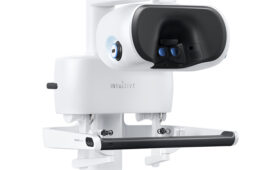
This schematic shows the bimodal neuromodulation device. [Image courtesy of B. Conlon et al., Science Translational Medicine (2020)]
The study — one of the largest clinical trials of a tinnitus treatment to date — indicates the bimodal technique could potentially provide the first effective, clinically viable device for tinnitus, which affects up to 15% of the population. This irritating auditory disorder manifests when patients perceive phantom noises such as ringing without any external input.
Despite its high prevalence and potentially debilitating nature, there are no approved medical devices or drug treatments that can provide relief to patients. However, recent research in animals has shown that stimulating the auditory nervous system through sounds and electricity improved symptoms.
Based on these results, Brendan Conlon of the Trinity College School of Medicine in Dublin, Ireland, and colleagues used a non-invasive stimulating device to deliver sound to the ears through headphones and stimulate the tongue with low amounts of electricity. The authors instructed the patients in the randomized trial to use the device for 60 minutes daily for 12 weeks. The device reduced tinnitus symptoms, and these improvements persisted throughout a 12-month follow-up period, according to a news release.
The team notes they are currently conducting another large clinical trial to study the effects of changing the stimulation protocol over time. The study was published in the journal Science Translational Medicine.



![A photo of the Medtronic GI Genius ColonPro polyp detection system flagging a potential sign of colon cancer during a colonoscopy. [Photo courtesy of Medtronic]](https://www.medicaldesignandoutsourcing.com/wp-content/uploads/2024/04/Medtronic-GI-Genius-doctors-268x170.jpg)
